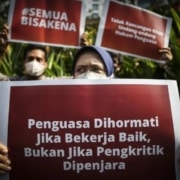
Indonesian Air Force servicemen presenting arms. Photo from WikiCommons.
Democracy thrives on a clear distinction between military, policing, and civilian roles. When these boundaries blur, there is cause for concern, so the passing of a new civil service law – known as the ASN law (Law no.20 of 2023) – on 2 October should sound alarm bells.
This is because Article 19 of the law allows active members of the army and police to occupy civilian positions. And the law offers reciprocity, with Article 20 also allowing civilians to take on police and military roles.
Taken at face value, the new law appears to usher in a new era of cooperation, allowing civilians to occupy leadership roles within the police and military and vice versa. But upon closer examination, it seems more pernicious.
First, it raises questions of practicality. Is a civilian genuinely qualified to hold a high-ranking post within the police? And conversely, is a military official equipped for the complexities of civilian governance?
More importantly, though, it raises questions of intent. With a presidential election just around the corner, does this new law signal impending electoral interference?
A history of blurred lines
Historically, Indonesia’s military and police force played a dual role throughout the authoritarian New Order of Soeharto, performing both military and civilian functions.
Officially known as the ‘dual function’ (dwifungsi), this doctrine was central to the New Order regime – having the military deeply embedded in governance helped Soeharto cling to power and maintain control throughout tumultuous times.
In 1998, Soeharto’s fall and the emergence of the Reformasi era brought democracy and, with it, an end to dual function. Legal and political reforms limited the direct involvement of police and military officials in civilian governance.
The Reformasi era assumed a distinct separation between military/police officers and civilians during elections. The envisioned role of servicemen and women was to help safeguard secure and fair electoral processes – not to influence outcomes or enter government.
In this context, the new ASN law is highly contentious. It risks resurrecting the dual role of the past, bringing the army back into government and threatening to undermine Indonesia’s democratic progress.
Another sign of democratic decline
Many pundits have commented on Indonesia’s democratic decline under the tenure of President Joko “Jokowi” Widodo. Article 19 of the new ASN law only supports this view because it reopens the door for the police and military to again take a more active role in Indonesian politics.
The speed and lack of transparency over the legislation was concerning. The sudden inclusion of the contentious clause, without a draft being made publicly available on the website of the national legislature (the DPR), undermines the role of the DPR of scrutinising laws to hold government accountable.
From a practical standpoint, the change also risks undermining professional standards. The military are trained in the use of force to maintain security and public order. This training and mindset can bring them into conflict with technocrats. It also creates a risk of military-style solutions being applied to civilian problems.
And, given the availability of competent civilians to perform these roles, one must ask why it would ever be necessary for members of the military and police to assume civilian responsibilities?
Questions about electoral integrity in 2024
For a democracy to function, a neutral electoral process, free of undue external influence, is essential. Maintaining this neutrality, especially on the part of key institutions like the police and armed forces, ensures both the credibility of elections and the legitimacy of their outcomes.
However, the territorial command system of the Indonesian army stretches deep into remote villages – the extensive reach of the Indonesian army can also be a powerful tool at election time if a candidate is willing and able to use it for political gain.
The timing of the changes introduced by the ASN law – so close to an election – is concerning. It calls into question the motivations for the law and raises questions about whether it could be used to influence the election process.
The changes undoubtably favour Prabowo Subianto, who is a former General and the current Minister of Defence. He has connections throughout the Indonesian armed forces and knows how it operates.
The changes also bode well for Jokowi, whose son, Gibran Rakabuming Raka was recently announced as Prabowo’s running mate. And, significantly, on 1 November Jokowi also appointed a key loyalist, General Agus Subiyanto, as head of the Indonesian armed forces.
Media and civil society will need to be vigilant in 2024
When considered in context of the New Order and Reformasi, the recent ASN law appears regressive. Not only does the law obscure the distinctions between military, policing, and civilian governance, it makes it easier for the military and police to exert undue influence over civilian matters, including elections.
This could lead to perceptions – whether valid or not – of increased militarisation or politicisation of the bureaucracy and the return of the military to leading positions in government. Such sentiments can damage public trust in the electoral process and international assessments of the quality of Indonesian democracy.
Given these dynamics, Indonesia’s civil society and media will need to remain vigilant in 2024. They must safeguard democratic norms, critically assess legislative changes and promote informed public discourse. The media will be particularly vital for analysing these shifts in impartially and educating the public about the consequences.
With an election looming, the ASN law’s potential to undermine public trust in the electoral process is significant. Now standing at a crucial juncture, Indonesia faces a choice – will it let these recent changes undermine its democratic progress? Or will it reinforce the foundations of its democracy against rising military influence and further democratic regression?











 https://www.antaranews.com/foto/3490728/arus-mudik-di-bandara-soekarno-hatta
https://www.antaranews.com/foto/3490728/arus-mudik-di-bandara-soekarno-hatta